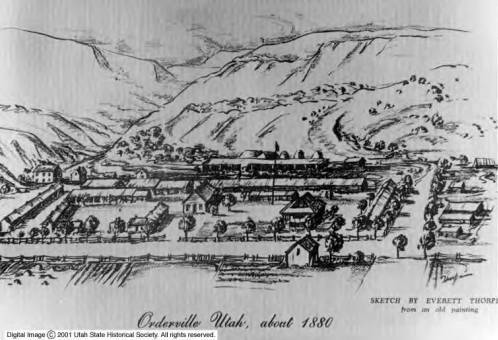Dublin Core
Title
Description
The United Order of Orderville, a Utopian living experiment, thrived for a decade in southern Utah.
When people hear the term “communal living,” what often comes to mind is a group of hippies, not a group of 19th Century Mormons. However, the United Order Movement begun in 1874 by LDS Church President Brigham Young was an attempt at economic and moral reform that was deeply rooted in Utopian community ideals.
Years after settling in Utah, Young and other Church leaders became concerned that commercial goods and moral influences brought by the railroad were undermining Mormon communal values. They became interested in reinstating Joseph Smith’s “Law of Consecration,” which in the 1830s had called for donating possessions to the Church for the larger benefit of its members. Inspired by Smith’s early cooperative experiments, Young created the “United Order of Enoch” and organized Church members into communal settlements.
One of the most successful communities to follow the “United Order” was appropriately named Orderville. Located in Kane County, east of Zion Canyon, Orderville was established on July 14, 1875, as an offshoot of the Mt. Carmel United Order.
Orderville community members had an unusually strict interpretation of communal living. They ate together in a common dining hall, wore uniform clothing that was locally-made, and lived in identical housing. An elected board supervised all social and economic activity, and residents were assigned to work in departments such as blacksmithing, midwifery, or farming. There was no private property, since all belongings were deeded to the Order. At the end of the year, accounts were balanced and those who had excess donated it back to the Order, while all debts were cancelled.
The community thrived, but took a major blow when polygamy was declared a felony in 1882. This forced the largely polygamous leadership of Orderville into hiding, which weakened the town. By 1885, Orderville abandoned strict communalism, but with over a decade of success, it was Utah’s longest-running experiment with the United Order.
Creator
Source
_______________
See Bradley, Martha Sonntag, A History of Kane County, Utah Centennial County History Series, Kane County (Utah): Utah State Historical Society and Kane County Commission, 1999; Pendleton, Mark A. “The Orderville United Order of Zion" Utah Historical Quarterly Volume 7, Number 4, October 1939, pp. 141-159; May, Dean, “The United Order Movement,” Utah History Encyclopedia.

